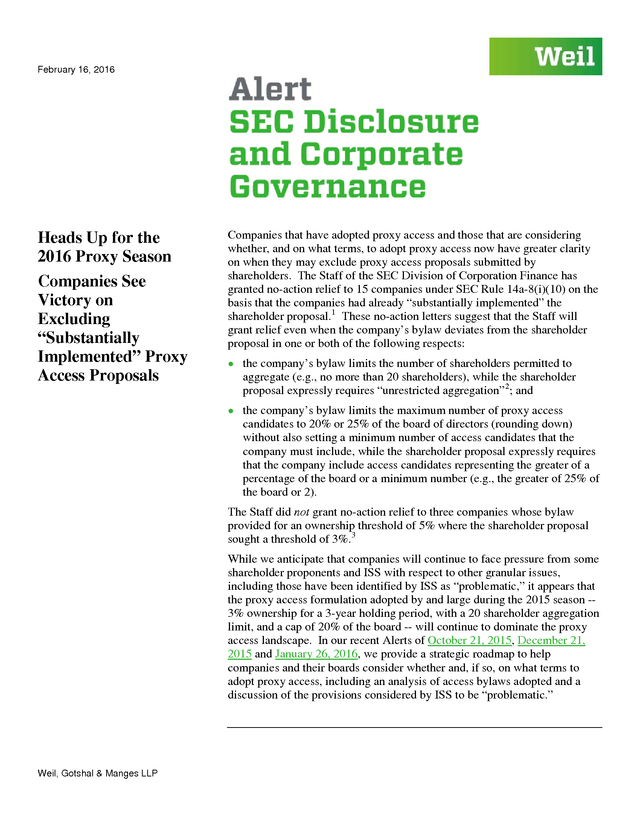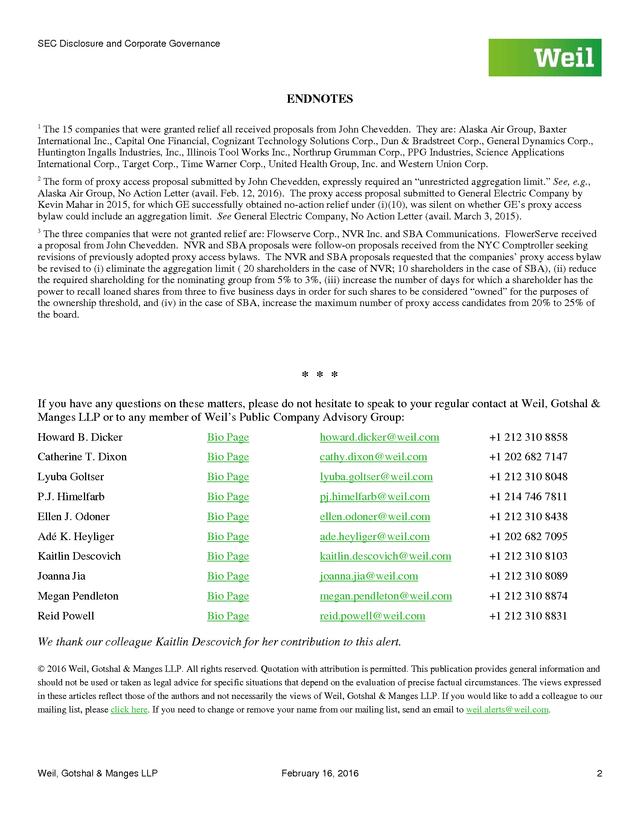Heads Up for the 2016 Proxy Season: Companies See Victory on Excluding "Substantially Implemented" Proxy Access - February 16, 2016
Weil, Gotshal & Manges
Description
February 16, 2016
Heads Up for the
2016 Proxy Season
Companies See
Victory on
Excluding
“Substantially
Implemented” Proxy
Access Proposals
Companies that have adopted proxy access and those that are considering
whether, and on what terms, to adopt proxy access now have greater clarity
on when they may exclude proxy access proposals submitted by
shareholders. The Staff of the SEC Division of Corporation Finance has
granted no-action relief to 15 companies under SEC Rule 14a-8(i)(10) on the
basis that the companies had already “substantially implemented” the
shareholder proposal. 1 These no-action letters suggest that the Staff will
grant relief even when the company’s bylaw deviates from the shareholder
proposal in one or both of the following respects:
â— the company’s bylaw limits the number of shareholders permitted to
aggregate (e.g., no more than 20 shareholders), while the shareholder
proposal expressly requires “unrestricted aggregation” 2; and
â— the company’s bylaw limits the maximum number of proxy access
candidates to 20% or 25% of the board of directors (rounding down)
without also setting a minimum number of access candidates that the
company must include, while the shareholder proposal expressly requires
that the company include access candidates representing the greater of a
percentage of the board or a minimum number (e.g., the greater of 25% of
the board or 2).
The Staff did not grant no-action relief to three companies whose bylaw
provided for an ownership threshold of 5% where the shareholder proposal
sought a threshold of 3%. 3
While we anticipate that companies will continue to face pressure from some
shareholder proponents and ISS with respect to other granular issues,
including those have been identified by ISS as “problematic,” it appears that
the proxy access formulation adopted by and large during the 2015 season -3% ownership for a 3-year holding period, with a 20 shareholder aggregation
limit, and a cap of 20% of the board -- will continue to dominate the proxy
access landscape.
In our recent Alerts of October 21, 2015, December 21, 2015 and January 26, 2016, we provide a strategic roadmap to help companies and their boards consider whether and, if so, on what terms to adopt proxy access, including an analysis of access bylaws adopted and a discussion of the provisions considered by ISS to be “problematic.” Weil, Gotshal & Manges LLP . SEC Disclosure and Corporate Governance ENDNOTES 1 The 15 companies that were granted relief all received proposals from John Chevedden. They are: Alaska Air Group, Baxter International Inc., Capital One Financial, Cognizant Technology Solutions Corp., Dun & Bradstreet Corp., General Dynamics Corp., Huntington Ingalls Industries, Inc., Illinois Tool Works Inc., Northrup Grumman Corp., PPG Industries, Science Applications International Corp., Target Corp., Time Warner Corp., United Health Group, Inc. and Western Union Corp. 2 The form of proxy access proposal submitted by John Chevedden, expressly required an “unrestricted aggregation limit.” See, e.g., Alaska Air Group, No Action Letter (avail. Feb.
12, 2016). The proxy access proposal submitted to General Electric Company by Kevin Mahar in 2015, for which GE successfully obtained no-action relief under (i)(10), was silent on whether GE’s proxy access bylaw could include an aggregation limit. See General Electric Company, No Action Letter (avail.
March 3, 2015). 3 The three companies that were not granted relief are: Flowserve Corp., NVR Inc. and SBA Communications. FlowerServe received a proposal from John Chevedden.
NVR and SBA proposals were follow-on proposals received from the NYC Comptroller seeking revisions of previously adopted proxy access bylaws. The NVR and SBA proposals requested that the companies’ proxy access bylaw be revised to (i) eliminate the aggregation limit ( 20 shareholders in the case of NVR; 10 shareholders in the case of SBA), (ii) reduce the required shareholding for the nominating group from 5% to 3%, (iii) increase the number of days for which a shareholder has the power to recall loaned shares from three to five business days in order for such shares to be considered “owned” for the purposes of the ownership threshold, and (iv) in the case of SBA, increase the maximum number of proxy access candidates from 20% to 25% of the board. * * * If you have any questions on these matters, please do not hesitate to speak to your regular contact at Weil, Gotshal & Manges LLP or to any member of Weil’s Public Company Advisory Group: Howard B. Dicker Bio Page howard.dicker@weil.com +1 212 310 8858 Catherine T.
Dixon Bio Page cathy.dixon@weil.com +1 202 682 7147 Lyuba Goltser Bio Page lyuba.goltser@weil.com +1 212 310 8048 P.J. Himelfarb Bio Page pj.himelfarb@weil.com +1 214 746 7811 Ellen J. Odoner Bio Page ellen.odoner@weil.com +1 212 310 8438 Adé K.
Heyliger Bio Page ade.heyliger@weil.com +1 202 682 7095 Kaitlin Descovich Bio Page kaitlin.descovich@weil.com +1 212 310 8103 Joanna Jia Bio Page joanna.jia@weil.com +1 212 310 8089 Megan Pendleton Bio Page megan.pendleton@weil.com +1 212 310 8874 Reid Powell Bio Page reid.powell@weil.com +1 212 310 8831 We thank our colleague Kaitlin Descovich for her contribution to this alert. © 2016 Weil, Gotshal & Manges LLP. All rights reserved. Quotation with attribution is permitted.
This publication provides general information and should not be used or taken as legal advice for specific situations that depend on the evaluation of precise factual circumstances. The views expressed in these articles reflect those of the authors and not necessarily the views of Weil, Gotshal & Manges LLP. If you would like to add a colleague to our mailing list, please click here.
If you need to change or remove your name from our mailing list, send an email to weil.alerts@weil.com. Weil, Gotshal & Manges LLP February 16, 2016 2 .
In our recent Alerts of October 21, 2015, December 21, 2015 and January 26, 2016, we provide a strategic roadmap to help companies and their boards consider whether and, if so, on what terms to adopt proxy access, including an analysis of access bylaws adopted and a discussion of the provisions considered by ISS to be “problematic.” Weil, Gotshal & Manges LLP . SEC Disclosure and Corporate Governance ENDNOTES 1 The 15 companies that were granted relief all received proposals from John Chevedden. They are: Alaska Air Group, Baxter International Inc., Capital One Financial, Cognizant Technology Solutions Corp., Dun & Bradstreet Corp., General Dynamics Corp., Huntington Ingalls Industries, Inc., Illinois Tool Works Inc., Northrup Grumman Corp., PPG Industries, Science Applications International Corp., Target Corp., Time Warner Corp., United Health Group, Inc. and Western Union Corp. 2 The form of proxy access proposal submitted by John Chevedden, expressly required an “unrestricted aggregation limit.” See, e.g., Alaska Air Group, No Action Letter (avail. Feb.
12, 2016). The proxy access proposal submitted to General Electric Company by Kevin Mahar in 2015, for which GE successfully obtained no-action relief under (i)(10), was silent on whether GE’s proxy access bylaw could include an aggregation limit. See General Electric Company, No Action Letter (avail.
March 3, 2015). 3 The three companies that were not granted relief are: Flowserve Corp., NVR Inc. and SBA Communications. FlowerServe received a proposal from John Chevedden.
NVR and SBA proposals were follow-on proposals received from the NYC Comptroller seeking revisions of previously adopted proxy access bylaws. The NVR and SBA proposals requested that the companies’ proxy access bylaw be revised to (i) eliminate the aggregation limit ( 20 shareholders in the case of NVR; 10 shareholders in the case of SBA), (ii) reduce the required shareholding for the nominating group from 5% to 3%, (iii) increase the number of days for which a shareholder has the power to recall loaned shares from three to five business days in order for such shares to be considered “owned” for the purposes of the ownership threshold, and (iv) in the case of SBA, increase the maximum number of proxy access candidates from 20% to 25% of the board. * * * If you have any questions on these matters, please do not hesitate to speak to your regular contact at Weil, Gotshal & Manges LLP or to any member of Weil’s Public Company Advisory Group: Howard B. Dicker Bio Page howard.dicker@weil.com +1 212 310 8858 Catherine T.
Dixon Bio Page cathy.dixon@weil.com +1 202 682 7147 Lyuba Goltser Bio Page lyuba.goltser@weil.com +1 212 310 8048 P.J. Himelfarb Bio Page pj.himelfarb@weil.com +1 214 746 7811 Ellen J. Odoner Bio Page ellen.odoner@weil.com +1 212 310 8438 Adé K.
Heyliger Bio Page ade.heyliger@weil.com +1 202 682 7095 Kaitlin Descovich Bio Page kaitlin.descovich@weil.com +1 212 310 8103 Joanna Jia Bio Page joanna.jia@weil.com +1 212 310 8089 Megan Pendleton Bio Page megan.pendleton@weil.com +1 212 310 8874 Reid Powell Bio Page reid.powell@weil.com +1 212 310 8831 We thank our colleague Kaitlin Descovich for her contribution to this alert. © 2016 Weil, Gotshal & Manges LLP. All rights reserved. Quotation with attribution is permitted.
This publication provides general information and should not be used or taken as legal advice for specific situations that depend on the evaluation of precise factual circumstances. The views expressed in these articles reflect those of the authors and not necessarily the views of Weil, Gotshal & Manges LLP. If you would like to add a colleague to our mailing list, please click here.
If you need to change or remove your name from our mailing list, send an email to weil.alerts@weil.com. Weil, Gotshal & Manges LLP February 16, 2016 2 .













